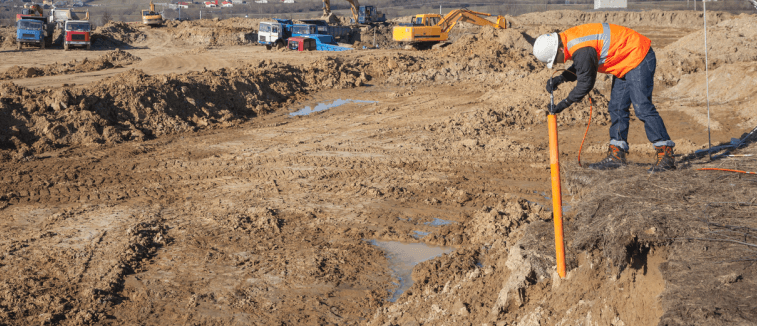Our Geotheta PDFs
Table of Contents10 Simple Techniques For GeothetaExcitement About GeothetaGeotheta Fundamentals ExplainedGeotheta Fundamentals ExplainedLittle Known Questions About Geotheta.

They conduct site investigations, gather examples, execute lab examinations, and assess data to examine the viability of the ground for building and construction jobs - Consulting Engineer. Based on their findings, geotechnical engineers supply suggestions for foundation layout, incline security, maintaining frameworks, and mitigation of geotechnical risks. They team up with various other specialists, such as architects, architectural engineers, and building and construction groups, to make certain that geotechnical factors to consider are integrated into the total job layout and execution
By analyzing the behavior and residential or commercial properties of dirt and rock, they can identify potential geotechnical dangers such as landslides, dirt negotiation, or slope instability. Their competence assists protect against failings or crashes that can endanger lives and building. Right here are some comprehensive tasks and obligations of a geotechnical designer: Site Investigation: Geotechnical engineers conduct website examinations to gather information on subsurface problems.
They interpret the information to understand the homes and behavior of the soil and rock, including their stamina, leaks in the structure, compaction qualities, and groundwater problems. Geotechnical Evaluation and Style: Geotechnical engineers analyze the information gathered throughout site investigations to assess the stability and viability of the website for building and construction tasks. They do geotechnical computations and modeling to assess elements such as birthing capability, settlement, slope security, side planet pressures, and groundwater circulation.
How Geotheta can Save You Time, Stress, and Money.
Structure Design: Geotechnical designers play a critical duty in creating foundations that can safely support the desired structure. They examine the dirt problems and load demands to identify the appropriate foundation type, such as superficial structures (e.g., footings), deep foundations (e.g (https://packersmovers.activeboard.com/t67151553/how-to-connect-canon-mg3620-printer-to-computer/?ts=1722609175&direction=prev&page=last#lastPostAnchor)., piles), or specialized strategies like soil renovation. They take into consideration aspects such as settlement limits, bearing capacity, and soil-structure interaction to develop optimum foundation styles
They evaluate building and construction strategies, display website activities, and carry out area examinations to validate that the layout recommendations are adhered to. If unexpected geotechnical problems develop, they analyze the scenario and supply referrals for removal or modifications to the layout. Risk Assessment and Mitigation: Geotechnical engineers assess geotechnical hazards and dangers linked with the job website, such as landslides, liquefaction, or soil erosion.

Cooperation and Interaction: Geotechnical engineers work very closely with various other specialists included in a project, such as engineers, structural designers, and building groups. Efficient communication and cooperation are vital to integrate geotechnical considerations into the general task style and building and construction procedure. Geotechnical engineers provide technical expertise, solution questions, and guarantee that geotechnical demands are satisfied.
Geotheta for Beginners
Right here are some sorts of geotechnical designers: Foundation Designer: Structure designers concentrate on creating and examining foundations for frameworks. They evaluate the dirt problems, lots requirements, and website features to identify one of the most appropriate foundation kind and style, such as superficial structures, deep structures, or specialized methods like pile structures.
They review the variables influencing incline security, such as soil properties, groundwater problems, and slope geometry, and create techniques to stop slope failings and minimize threats. Earthquake Engineer: Quake engineers concentrate on examining and making structures to endure seismic pressures. They evaluate the seismic threat of a site, review dirt liquefaction potential, and establish seismic layout requirements to guarantee the safety and security and strength of frameworks throughout quakes.
They execute field screening, collect examples, and assess the accumulated data to define the soil residential or commercial properties, geologic formations, and groundwater problems at a website. Geotechnical Instrumentation Designer: Geotechnical instrumentation designers concentrate on tracking and gauging the behavior of dirt, rock, and frameworks. They set up and preserve instrumentation systems that keep an eye on factors such as dirt negotiation, groundwater levels, incline activities, and architectural displacements to examine efficiency and offer very early warnings of potential problems.
Getting The Geotheta To Work
They carry out examinations such as triaxial tests, consolidation tests, straight shear tests, and leaks in the structure tests to gather data for geotechnical evaluation and design. Geosynthetics Designer: Geosynthetics designers specialize in the layout and application of geosynthetic materials, such as geotextiles, geogrids, and geomembranes. They utilize these materials to enhance dirt security, strengthen slopes, provide drainage solutions, and control erosion.
They tend to be investigatory individuals, which means they're intellectual, introspective, and curious. They are curious, systematic, sensible, analytical, and sensible. Some of them are likewise social, indicating they're kind, generous, cooperative, patient, caring, helpful, empathetic, skillful, and friendly. Does this noise like you? Take our cost-free job test to figure out if geotechnical designer is one of your top career suits.
In the workplace setting, geotechnical designers utilize specialized software devices to execute estimations, produce styles, and examine data. They prepare records, evaluation job specifications, communicate with customers and staff member, and coordinate task tasks. The office setting supplies a helpful setting for study, evaluation, and collaboration with other professionals associated with the task.
The Only Guide for Geotheta
They frequently see job websites to perform site examinations, analyze geotechnical conditions, and gather data for evaluation. These check outs involve traveling to various areas, often in remote or difficult surfaces. Geotechnical engineers might carry out soil sampling, conduct tests, and display construction tasks to ensure that the geotechnical aspects of the task are being implemented properly.
Geotechnical engineers also function in specialized geotechnical laboratories. In these facilities, they perform experiments, carry out examinations on dirt and rock samples, and analyze the engineering properties of the products. Geotechnical research laboratory designers work extensively in these atmospheres, taking care of testing devices, operating instruments, and videotaping information. They collaborate with various other lab staff to make certain precise and reputable screening outcomes.